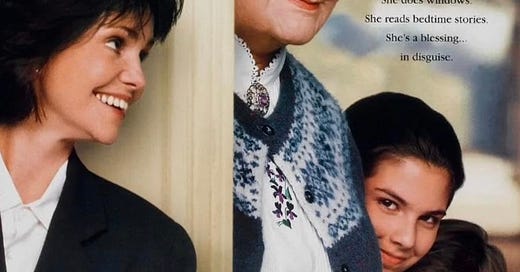Welcome to And the Quest for Pop Culture, where I explore various movies, TV shows, books, and comics. Looking for a different topic or original fiction? Check out the navigation page.
To save his family, a man must adopt a new identity. He must transform into a better version of himself. He must become—Mrs. Doubtfire!
Mrs. Doubtfire is a classic farce, with the main character’s dual identity leading to all sorts of humorous situations. More important, it’s a farce with a heart. A newly divorced and chronically irresponsible dad goes to tremendous lengths to spend time with his three children simply because he loves them that much.
Robin Williams stars as Daniel Hillard and his alter ego, Mrs. Doubtfire. The whole production caters to Williams’s strengths. At several points, they clearly set the script aside and said, “Just do your thing, Robin.”
But there is a script, a pretty solid one by Randi Mayem Singer and Leslie Dixon. For all the hijinks, the story is ultimately about a family coming to terms with their new situation after a divorce. The script sympathizes with both parents as well as the kids.
Miranda (Sally Field) initiates the divorce, and you really can’t blame her. She works hard to support the family, which frees Daniel to quit his own job on a matter of principle. He’s a cartoon voice actor, but he goes off-script (see, all geared for Robin Williams) when a cigarette is shoved into his character’s mouth. Not wanting to send the wrong message to kids, he quits. He has a valid point, but he’s also placing a greater burden on his wife.
Now shorn of any work responsibilities, Daniel picks his kids up from school and throws a wild birthday party for his son, complete with zoo animals. Miranda has to be the bad guy—i.e., the responsible adult—and shut down all the fun. It’s a lousy situation to put her in, and it leads her to a conclusion she had hoped to avoid: She doesn’t like the person she becomes around him; she doesn’t like the person his behavior requires her to become.
The custody hearing does not go well for Daniel, given that he has no job and can offer no stability. He gets to see his kids once per week, which is a tough sentence for a man who wants nothing more than to be a good dad.
But when he learns Miranda wants to hire a housekeeper, he gets an idea—a terrible and deeply unethical idea by real-world standards, but a fun and whimsical idea by high-concept movie standards. With the help of his makeup artist brother (Harvey Fierstein), he crafts an elaborate new persona, a kindly old Englishwoman named Mrs. Doubtfire.
Juggling two identities creates hard work for Daniel and great fun for the audience, especially when Daniel and Mrs. Doubtfire need to be at the same place at the same time. In the restaurant scene, when everything comes to a head, it’s pure farce. Daniel has an important meeting with a TV studio president, Jonathan Lundy (Robert Prosky), while Mrs. Doubtfire has promised to attend Miranda’s birthday dinner with the family. Daniel keeps disappearing behind the bathroom door to switch identities (and he needs to keep track of which bathroom door to disappear behind). Lundy plies him with scotch, making it even more difficult for Daniel to keep his two identities straight.
But Mrs. Doubtfire is no ordinary farce. The role of Mrs. Doubtfire is the cocoon in which Daniel develops into a better man. To play a housekeeper character, he must take the time to learn housekeeping skills, and he needs to be a responsible adult around the kids. He indulges in some passive-aggressive behavior with Miranda’s new romantic interest (Pierce Brosnan), but otherwise, portraying a mature lady makes a more mature man out of him.
Daniel’s apartment symbolizes his transformation. At first, the place is in total disarray, reflecting his natural irresponsibility. But as he embraces the Mrs. Doubtfire role, he turns his apartment into an actual home.
Still, for all its sentimentality, Mrs. Doubtfire avoids having too tidy of a resolution. Daniel does get what he wants the most—joint custody of his kids. He even becomes a children’s television star. But he does not get back together with Miranda. They can’t salvage the marriage, and they both must move on as individuals. This anchors the movie in a semblance of reality, and it’s better off for it.
In a way, Daniel is like Homer Simpson. He can be a fool and a clown who inadvertently creates problems for his family, but he truly does love them. When he screws up, he does whatever he can to set things right. Unlike Homer, though, Daniel grows up along the way.
If you haven’t watched it in a while, Mrs. Doubtfire is worth revisiting this Father’s Day. Or anytime really. It’s never the wrong time for a good Robin Williams movie.
Here’s another good option:






A "terrible and deeply unethical idea by real-world standards, but a fun and whimsical idea by high-concept movie standards" is a great way of putting it! 😆
I agree with most of what you said!
And I just wanted to add that Daniel getting called out for his actions by the judge near the end also adds to the semblance of reality that you mentioned - which, as you also said, makes the ending that much better when things are finally resolved. 🙂